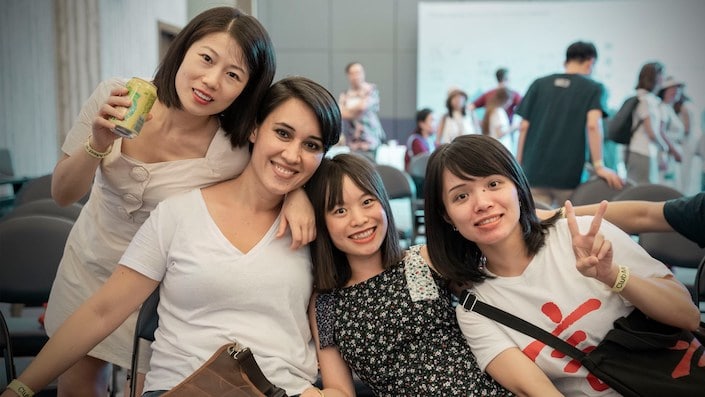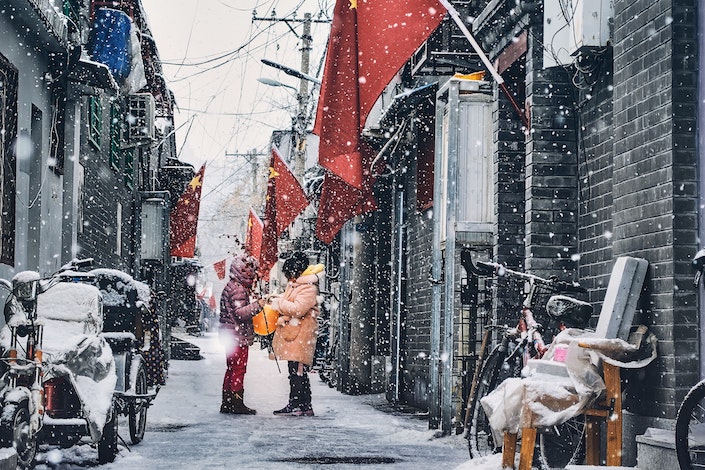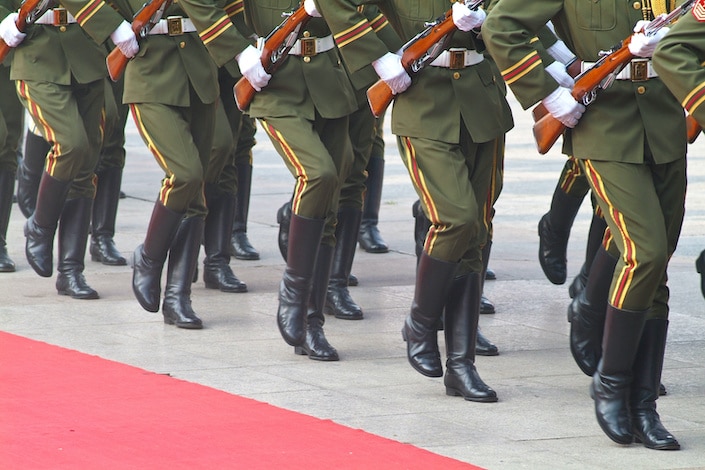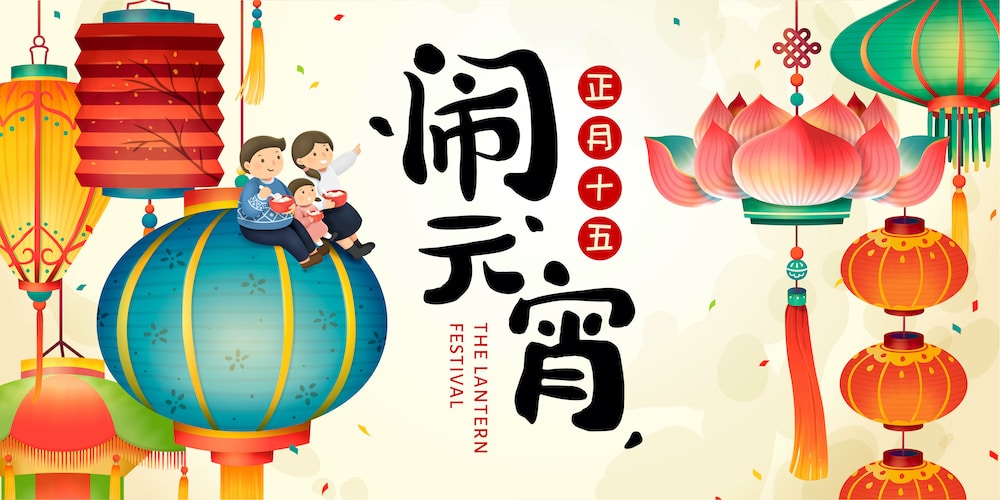Christmas in China: Everything You Need to Know
Learn Chinese in China or on Zoom and gain fluency in Chinese!
Join CLI and learn Chinese with your personal team of Mandarin teachers online or in person at the CLI Center in Guilin, China.
Christmas has arrived in China and we are ready to celebrate! Believe it or not, December 25th has gradually carved out its own unique place in the Chinese holiday calendar. Join us as we learn more about Christmas in China.

Table of Contents
- The Name and Its Meaning
- Christmas Day in China
- The Historical Roots of Christmas in China
- Christmas and Cultural Debates
- Christmas as a Romantic and Commercial Holiday
- Unusual Christmas Foods
- Celebrating Christmas in China as a Visitor or Expat
- The Unique Tapestry of Christmas in the Middle Kingdom
- Learn Your Christmas in China Vocabulary!
The Name and Its Meaning
The term for Christmas in Mandarin, 圣诞节 (shèngdàn jié in pinyin), is not just a translation but a reflection of the holiday's nature and its adaptation into Chinese culture. Each character in this term carries its own significance and collectively, they encapsulate the essence of Christmas as understood in the Chinese context.
- 圣 (shèng): This character stands for "saint" or "holy," capturing the sacred aspect of the holiday. It's a nod to the religious origins of Christmas, marking it as a day that holds spiritual significance, particularly for those who understand and observe its Christian roots.
- 诞 (dàn): This character means "birth," and it's directly linked to the reason Christmas is celebrated globally – the birth of Jesus Christ. In the Chinese rendition of the holiday, this aspect of Christmas is acknowledged, even though the religious connotation might not be as pronounced as in Western countries.
- 节 (jié): Translating to "holiday" or "festival," this character is often used in the names of various celebrations throughout the Chinese calendar. Its use here positions Christmas as a festive occasion, aligning it with other significant days in the Chinese cultural and social landscape.

Christmas in China uniquely intertwines Western festive customs with Chinese cultural elements, creating a holiday experience that's both globally familiar and distinctly local.
Christmas Day in China
While globally Christmas might be celebrated over an extended period, often encompassing the days leading up to and following December 25th, in mainland China, the observation of Christmas is more concise and focused.
Its One-Day Celebration – No More No Less!
Unlike many Western countries where Christmas celebrations can span from Christmas Eve through to Boxing Day or even extend into the New Year, in China, the festivities are primarily concentrated on December 25th. This focused celebration reflects China's approach to integrating this Western tradition into its own cultural calendar without extending it into a prolonged holiday season.
In mainland China, the concept of Boxing Day or Second Christmas Day, as observed in some Western countries, is non-existent. This absence underlines the different cultural approach to the holiday – it is acknowledged and celebrated, but without the extended holiday period typically seen in the West.
In mainland China, December 25th is not a public holiday, which means that businesses, government offices, and schools generally operate as usual. However, some international schools and businesses with Western ties might offer a day off or hold special events to mark the occasion.
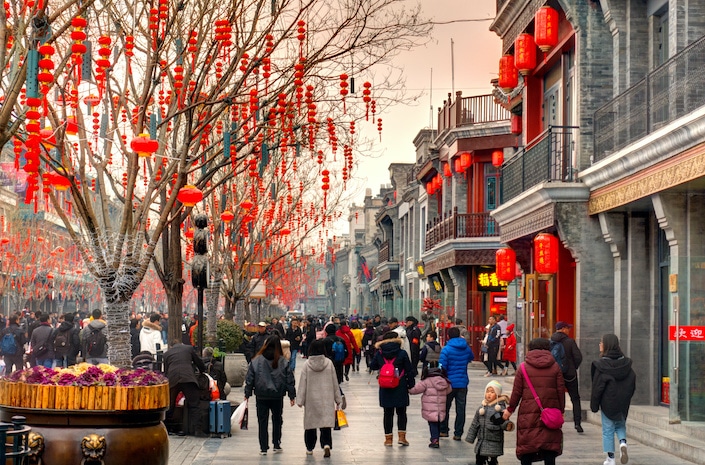
In mainland China, Christmas is celebrated primarily on December 25th without extended holidays like Boxing Day, and it is not a public holiday, with most businesses and schools operating as usual.
Christmas in Hong Kong and Macau
In contrast to Mainland China, where Christmas is largely commercial, Hong Kong and Macau celebrate it with a blend of traditional and festive Western customs. As official public holidays, December 25th and Boxing Day are marked with vibrant celebrations reflecting their unique cultural mix.
Hong Kong becomes a winter wonderland, with skyscrapers and public spaces adorned in dazzling lights, Christmas trees, and festive displays. Victoria Harbour's Symphony of Lights and attractions like Harbour City, Pacific Place, and Hong Kong Disneyland create a festive buzz. Midnight mass at churches like St. John’s Cathedral and family feasts combining Western and Cantonese flavors highlight the season.
Macau, with its Portuguese heritage, brings a distinct charm to Christmas. Senado Square is adorned with lights and decorations, while historic churches like St. Dominic’s host services and concerts. Traditional Portuguese dishes like bacalhau and bolo rei mix with local culinary favorites. Luxury hotels and casinos add flair with themed shows and markets.
In both regions, Christmas is a time for family, community, and the fusion of Eastern and Western traditions, from gift-giving and Santa Claus to seasonal dim sum and Chinese-style Christmas cakes. The extended holiday offers a festive and memorable experience.

In Hong Kong and Macau, Christmas is a public holiday celebrated with a blend of Western traditions and local customs, featuring festive lights, church services, and unique culinary delights that reflect their cultural diversity.
Varied Observance Across China
The extent and style of Christmas celebration can vary significantly across different regions in China. In major metropolitan areas with greater Western influence, such as Beijing and Shanghai, Christmas might be observed with more fanfare, including decorations, themed events, and retail promotions. In contrast, in more rural or less Western-influenced areas, Christmas might pass with little to no acknowledgment.
In summary, Christmas Day in China is a unique blend of traditional Western customs and contemporary Chinese practices. It stands out as a day of cultural significance and celebration, yet it is woven into the fabric of everyday life without the extended holiday period seen elsewhere.
This approach highlights the adaptability and selective integration of global traditions within the diverse cultural landscape of China.

Christmas in China is a unique blend of Western traditions and local customs, celebrated with festive decorations and joyous gatherings.
The Historical Roots of Christmas in China
The evolution of Christmas celebrations in China traces a fascinating journey from ancient religious observances to contemporary secular festivities, mirroring the nation's historical and cultural shifts.
This section delves into the transformation of Christmas from its early Christian influences during the Tang Dynasty to its modern incarnation, shaped by globalization and cultural debates within contemporary Chinese society.
Early Christian Influence
The inception of Christmas celebrations in China can be traced back to the Tang Dynasty (618-907 AD), a period known for its openness to foreign cultures and ideas. During this era, Christian missionaries were active in China, and it is believed that they were the ones who introduced the concept of Christmas, primarily as a religious observance. These early celebrations were modest and largely confined to the Christian communities established by the missionaries.

Christmas celebrations in China began modestly during the Tang Dynasty (618-907 AD) through the influence of Christian missionaries, focusing primarily on religious observance within Christian communities.
20th Century and The People's Daily
Fast forward to the 1940s, the concept of Christmas re-emerged in China, primarily through mentions in The People's Daily newspaper. However, these references were often not about celebrations within China but rather used Christmas as a time reference in discussing Western events.
Post-1978 Reforms and Western Influence
The real resurgence of Christmas in China began after the economic reforms of 1978, which opened China to increased contact with Western countries. This period marked the beginning of Christmas symbols and traditions seeping into Chinese popular culture, especially in urban areas. By the 1990s, some cities in China began to adopt Christmas decorations and customs, although these were largely secular in nature.

Christmas gained prominence in China post-1978 economic reforms, with Western influence introducing secular decorations and traditions, particularly in urban areas, by the 1990s.
Contemporary Celebrations
Today's Christmas celebrations in China are a far cry from the religious observances of the Tang Dynasty or the limited references in mid-20th-century media. They have evolved into a fusion of Western and Chinese cultural elements, marked by commercialization, romantic themes, and festive decorations, reflecting China's journey through history and its evolving relationship with global cultures.
In essence, the historical roots of Christmas in China highlight the nation's journey from early Christian influences to a modern interpretation that blends Western traditions with Chinese cultural elements. This evolution is a testament to China's dynamic cultural landscape, which continues to adapt and incorporate diverse global influences.

Today's Christmas in China, distinct from its Tang Dynasty religious origins and mid-20th-century references, embodies a commercial, romantic, and festively decorated fusion of Western and Chinese cultures, symbolizing China's historical and cultural evolution in embracing global influences.
Christmas and Cultural Debates
The celebration of Christmas in China, particularly in its modern form, has sparked a variety of cultural debates, reflecting the country's complex relationship with Western influences and its own cultural identity.
Cultural Assimilation vs. Preservation
As Christmas gains popularity in China, it raises questions about cultural assimilation and the preservation of traditional Chinese culture. Some view the adoption of Christmas as a sign of openness and global integration, while others express concerns about Western cultural hegemony overshadowing China's rich and ancient traditions. This tension reflects a broader dialogue on how China navigates its rapidly changing cultural landscape in an increasingly globalized world.
Nationalistic Sentiments
In recent years, there has been a growing nationalistic sentiment among certain groups who argue against the celebration of Christmas. They see it as an unwarranted encroachment of Western culture, potentially eroding the values and traditions unique to Chinese society. These groups advocate for a stronger emphasis on native festivals and traditions, fearing that the popularity of Western holidays like Christmas might lead to a cultural dilution.

Recently, some groups in China have increasingly opposed Christmas celebrations, viewing them as intrusive Western influences that threaten traditional Chinese values and advocate for a renewed focus on native festivals to prevent cultural dilution.
Governmental Stance and Regulations
The Chinese government's stance on Christmas celebrations has been somewhat ambivalent, reflecting the broader tension between globalization and cultural preservation. While there haven't been outright bans on celebrating Christmas, there have been instances where local authorities have discouraged or limited public displays of Christmas festivity, often citing the need to preserve Chinese cultural traditions.
Commercialization vs. Cultural Significance
Another aspect of the debate centers around the commercialization of Christmas. For many in China, Christmas is less about its religious or cultural significance and more about its commercial potential – a phenomenon not unique to China. This commercial aspect often overshadows any religious connotations of the holiday, leading to discussions about the true meaning and relevance of celebrating Christmas in a predominantly non-Christian country.
Educational Perspectives
In the educational domain, the debate extends to whether and how Christmas should be introduced in schools. While some educational institutions embrace it as an opportunity to teach about global cultures, others prefer to focus on Chinese festivals and traditions, often out of concern that celebrating Western holidays might detract from the appreciation of native cultural heritage.
These cultural debates around Christmas in China underscore the complexities and nuances of cultural exchange in a globalized era. They reflect the ongoing conversation about identity, tradition, and modernity in contemporary China – a dialogue that continues to shape the country's cultural evolution.

The debate in China's education sector about incorporating Christmas ranges from using it as a tool for global cultural education to focusing on Chinese traditions, reflecting broader discussions on cultural identity and exchange in a globalized era.
Christmas as a Romantic and Commercial Holiday
In China, the perception and celebration of Christmas have taken a unique turn, differentiating it from traditional Western observances. This unique interpretation reflects the dynamic nature of cultural exchange and adaptation in modern China.
Romantic Connotations
- Valentine's Day Resemblance: In mainland China, Christmas is often viewed through a lens similar to that of Valentine's Day. It is seen as a day for romantic gestures and expressions of love, particularly among young couples. The holiday provides an opportunity for sharing intimate moments, exchanging gifts, and enjoying special dates. Common activities include ice skating, visiting amusement parks, or attending Christmas-themed events, all seen as part of romantic courtship.
- Youth Culture and Christmas: For many young Chinese, Christmas is less about its religious background and more about the social and romantic aspects it brings. This shift reflects a broader trend in which global festivals are adapted to fit local cultural contexts and preferences. Young people often use this holiday as an excuse to throw parties, meet with friends, and participate in various festive activities that have a more secular and social flavor.

In mainland China, Christmas is predominantly viewed as a romantic occasion similar to Valentine's Day, especially among the youth, focusing on social and romantic activities rather than its religious origins.
Commercial Impact
- Shopping and Gift-Giving: The commercial aspect of Christmas in China is significant. Retailers capitalize on the holiday's romantic connotations, promoting various sales and special offers to attract young shoppers. Men, in particular, may feel the pressure to buy expensive gifts for their partners, turning Christmas into a high-spending event.
- Marketing Strategies: Many stores and shopping malls in urban areas are decked out with Christmas decorations, from sparkling lights to ornate trees, creating a festive shopping atmosphere. These decorations are often accompanied by promotions and sales that are strategically designed to boost consumer spending during the holiday season.
- Consumer Trends: Interestingly, the commercialization of Christmas in China also reflects global consumer trends. The emphasis on gift-giving and festive spending aligns with how Christmas is increasingly celebrated in many parts of the world, focusing more on the commercial aspects than on the religious or cultural significance of the holiday.
- Economic Benefits: Beyond individual consumer behavior, the Christmas season also has broader economic implications. As a global manufacturing hub, China plays a significant role in producing Christmas-related goods, from decorations to toys, contributing to the country's economy. The holiday season, therefore, not only impacts domestic consumption but also has international economic repercussions.
In essence, Christmas in China as a romantic and commercial holiday showcases how a Western tradition can be reinterpreted and assimilated into a different cultural context. It reflects China's contemporary societal values and consumer culture, where global traditions are adapted to fit local tastes and preferences, creating a unique celebration that is distinctively Chinese.

In China, marketers have effectively adapted Christmas promotions to local preferences, focusing on joy and togetherness, making it a key part of the commercial calendar and mirroring Western trends of emphasizing the holiday's commercial rather than religious aspects.
Unusual Christmas Foods
The culinary aspect of Christmas in China stands out for its unique adaptations, merging traditional Western holiday fare with local tastes and customs. This fusion results in a distinctive gastronomic experience during the festive season.
The Apple Tradition
- Symbolic Significance: One of the most intriguing Christmas traditions in China is the gifting and eating of apples on Christmas Eve. This practice stems from a linguistic play: in Mandarin, the word for apple, "苹果" (píngguǒ), sounds similar to the word for peace, "平安" (píng'ān). Given that Christmas Eve is known as "平安夜" (Píng'ān Yè, Peaceful Night), apples have become a symbol of peace and tranquility during the holiday season.
- Decorative and Meaningful Gifts: In many parts of China, it is customary to gift beautifully wrapped apples to friends and family on Christmas Eve. These apples are often adorned with colorful papers or ribbons and sometimes bear inscriptions or stickers with messages of love, peace, or Christmas greetings. This tradition not only adds a unique flavor to the Christmas celebration but also embodies the spirit of goodwill and harmony associated with the holiday.
Diverse Christmas Meals
- No Standardized Feast: Unlike the West, where traditional Christmas meals might include turkey, ham, or roast beef, there is no single standard Christmas meal in China. The Christmas dinner varies widely, with people choosing to celebrate with various kinds of feasts, often influenced by local culinary traditions or personal preferences.
- Restaurant Celebrations: For many Chinese, especially the younger generation, Christmas is an opportunity to dine out. Restaurants across China offer special Christmas menus or themed dinners, with some featuring Western-style dishes and others offering a fusion of Western and Chinese cuisines. These dining experiences often serve as a central part of Christmas celebrations for couples, families, and friends.
- KFC's Christmas Promotion: One peculiar Christmas tradition that has gained popularity in China, inspired by a similar trend in Japan, is the consumption of KFC fried chicken. KFC's successful marketing campaigns have positioned their fried chicken as a sought-after Christmas meal, leading to long queues and advance orders during the festive season in major cities.

Christmas in China features a unique culinary fusion, blending traditional Western holiday dishes with local tastes and customs for a distinctive gastronomic experience.
The unusual Christmas foods in China highlight the country's ability to blend global traditions with local flavors, creating unique and memorable holiday experiences. The adaptation of foods like apples and the popularity of restaurant dining or fast food during Christmas underscore the evolving nature of the holiday's celebration in China, reflecting both global influences and indigenous cultural preferences.
Celebrating Christmas in China as a Visitor or Expat
For visitors or expatriates in China, experiencing Christmas can be a unique blend of familiar traditions and new, culturally rich practices. This period offers a fascinating glimpse into how a Western festival is reinterpreted within the Chinese cultural landscape.
Embracing the Fusion of Cultures
- Seeking Familiar Traditions: Expats often seek to recreate the warmth and nostalgia of Christmas as celebrated in their home countries. This could involve decorating their homes with Christmas trees, lights, and other traditional ornaments. Expatriates might gather for festive meals, sharing dishes that remind them of home, or trying to blend local ingredients into traditional recipes.
- Community Gatherings and Events: Many expat communities in China organize Christmas events, parties, or markets, providing a space to celebrate with others who share a similar cultural background. These events often feature traditional Christmas music, gift exchanges, and sometimes even activities for children, such as crafting or storytelling sessions about Christmas traditions.

Capturing the festive spirit, these three Chinese Santas blend traditional music with Christmas cheer, skillfully playing drums and cymbals.
Exploring Chinese Christmas Celebrations
- Local Interpretations: Visitors and expats have the unique opportunity to observe and participate in China's version of Christmas celebrations. This might include walking through brightly lit shopping malls, experiencing the festive atmosphere in urban centers, or even attending Christmas-themed events hosted by local businesses or communities.
- Culinary Adventures: Trying out Christmas specials at restaurants or enjoying the unique tradition of eating apples on Christmas Eve can be a delightful experience. For those looking to indulge in more familiar tastes, international hotels and restaurants in major cities often offer traditional Christmas dinners.
Adapting to a Different Holiday Experience
- Cultural Learning Opportunity: Living in or visiting China during Christmas allows expatriates and tourists to learn about the cultural adaptation of a global festival. It's an enlightening experience that showcases the globalized yet localized nature of contemporary cultural celebrations.
- Navigating the Commercial Aspect: As the commercial side of Christmas is prominent in China, visitors and expats can explore shopping districts and markets that are specially decorated for the holiday season. This includes enjoying the sight of Chinese Santa Claus figures and experiencing the hustle and bustle of holiday shopping, often accompanied by sales and promotions.

Adapting to Christmas in China offers a cultural learning opportunity through the localized celebration of a global festival, while the prominent commercial aspect invites visitors to explore festive markets, shopping districts, and unique holiday traditions.
Building New Traditions
- Creating Personalized Celebrations: Expats and visitors often find innovative ways to blend their traditions with local customs, creating a personalized Christmas experience. This might involve combining Western-style gift-giving with the Chinese tradition of gifting apples, or participating in local events while keeping some personal festive rituals.
Celebrating Christmas in China as a visitor or expat is a unique experience that combines the comfort of familiar traditions with the excitement of new cultural practices.
It offers a rare opportunity to witness and partake in the global spread and adaptation of cultural festivals, highlighting the interconnectedness and diversity of modern societies.
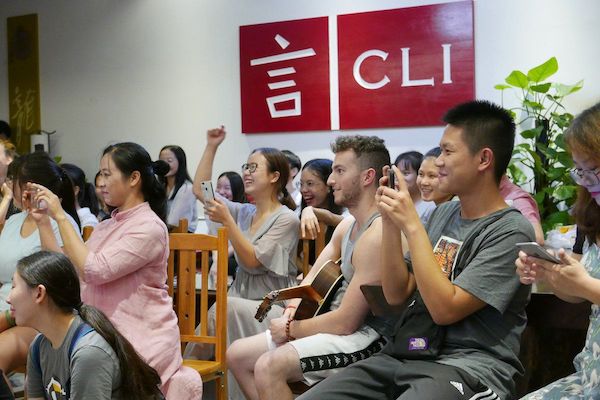
Students at CLI find a variety of ways to celebrate Christmas together each year.
The Unique Tapestry of Christmas in the Middle Kingdom
Christmas in China is a unique phenomenon, interweaving Western traditions with Chinese cultural elements, commercial interests, and modern adaptations. Whether you're a local, expat, or visitor, Christmas in China offers a vibrant and diverse celebration unlike anywhere else in the world.
During the days and weeks leading up to Christmas, it is very common for Chinese students of all ages to exchange Christmas cards, wear costumes and get into the holiday spirit. As a unique Christmas Eve tradition, many young couples present each other with red apples, a custom born out of the Mandarin word for Christmas Eve, which sounds similar to the word for apple.
Friends and family members might also take advantage of holiday sales and give each other small gifts, some even purchasing faux Christmas trees to adorn their living rooms. If you find yourself in China during Christmas time, keep your eyes peeled for restaurants offering 八宝鸭 (bā bǎo yā, eight treasures duck), duck stuffed with chicken, ham, shrimp and more — a Chinese-style Christmas dinner!

Friends, students and teachers celebrate Christmas each year at CLI. We welcome you to join us one year for Christmas or otherwise!
Learn Your Christmas in China Vocabulary!
| Chinese | Pinyin | English |
|---|---|---|
| 圣诞节 | Shèngdànjié | Christmas |
| 平安夜 | Píng'ān Yè | Christmas eve |
| 白色圣诞 | báisè Shèngdàn | White Christmas |
| 圣诞快乐 | Shèngdàn kuàilè | Merry Christmas |
| 圣诞树 | Shèngdànshù | Christmas tree |
| 拐杖糖 | guǎizhàngtáng | candy cane |
| 礼物 | lǐwù | gift/present |
| 圣诞袜 | Shèngdànwà | stocking |
| 圣诞红 | Shèngdànhóng | Poinsettia |
| 姜饼屋 | jiāngbǐngwū | gingerbread house |
| 圣诞卡 | Shèngdànkǎ | Christmas card |
| 圣诞老人 | Shèngdàn Lǎorén | Santa Claus |
| 雪橇 | xuěqiāo | sleigh |
| 麋鹿 | mílù | reindeer |
| 基督教徒 | Jīdūjiàotú | Christian |
| 雪人 | xuěrén | snowman |
| 姜饼人 | jiāngbǐngrén | gingerbread man |
| 报佳音 | bàojiāyīn | caroling |

Tania holds a BA in Arabic and Chinese from the University of Leeds, which led her to spend two years studying in Taiwan and Egypt as part of her degree. Her interests include Chinese traditional theater, international education, and programming. Tania travels to China annually and is fluent in Chinese.





